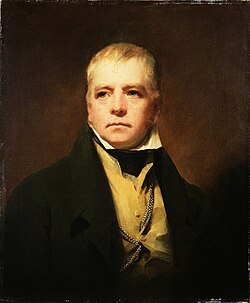Sir Walter Scott, 1st Baronet
| Sir Walter Scott, Bt | |
|---|---|

Raeburn's portrait of Sir Walter Scott in 1822
|
|
| Born | 15 August 1771 College Wynd, Edinburgh Scotland |
| Died | 21 September 1832 (aged 61) Abbotsford, Roxburghshire Scotland |
| Occupation | |
| Nationality | British |
| Alma mater | University of Edinburgh |
| Period | 19th century |
| Literary movement | Romanticism |
| Spouse | Charlotte Carpenter (Charpentier) |
|
|
|
| Signature |  |
Sir Walter Scott, 1st Baronet, FRSE (15 August 1771 – 21 September 1832) was a Scottish historical novelist, playwright and poet. Many of his works remain classics of both English-language literature and of Scottish literature. Famous titles include Ivanhoe, Rob Roy, Old Mortality, The Lady of the Lake, Waverley, The Heart of Midlothian and The Bride of Lammermoor.
Although primarily remembered for his extensive literary works and his political engagement, Scott was an advocate, judge and legal administrator by profession, and throughout his career combined his writing and editing work with his daily occupation as Clerk of Session and Sheriff-Depute of Selkirkshire.
A prominent member of the Tory establishment in Edinburgh, Scott was an active member of the Highland Society and served a long term as President of the Royal Society of Edinburgh (1820–32).
The son of a Writer to the Signet (solicitor), Scott was born in 1771 in his Presbyterian family's third-floor flat on College Wynd in the Old Town of Edinburgh, a narrow alleyway leading from the Cowgate to the gates of the University of Edinburgh (Old College). He survived a childhood bout of polio in 1773 that left him lame, a condition that was to have a significant effect on his life and writing. To cure his lameness he was sent in 1773 to live in the rural Scottish Borders at his paternal grandparents' farm at Sandyknowe, adjacent to the ruin of Smailholm Tower, the earlier family home. Here he was taught to read by his aunt Jenny, and learned from her the speech patterns and many of the tales and legends that characterised much of his work. In January 1775 he returned to Edinburgh, and that summer went with his aunt Jenny to take spa treatment at Bath in England, where they lived at 6 South Parade. In the winter of 1776 he went back to Sandyknowe, with another attempt at a water cure at Prestonpans during the following summer.
...
Wikipedia
